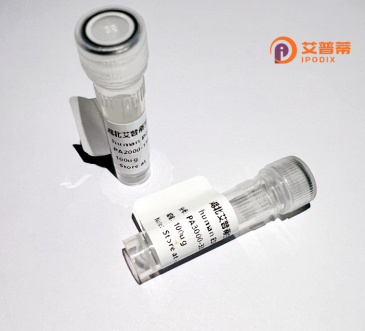
| 纯度 | >90%SDS-PAGE. |
| 种属 | Human |
| 靶点 | PSMAL |
| Uniprot No | Q9HBA9 |
| 内毒素 | < 0.01EU/μg |
| 表达宿主 | E.coli |
| 表达区间 | 1-442 aa |
| 活性数据 | MGGSAPPDSS WRGSLKVSYN VGPGFTGNFS TQKVKMHIHS TNEVTRIYNV IGTLRGAVEP DRYVILGGHR DSWVFGGIDP QSGAAVVHET VRSFGTLKKE GWRPRRTILF ASWDAEEFGL LGSTEWAEDN SRLLQERGVA YINADSSIEG NYTLRVDCTP LMYSLVYNLT KELKSPDEGF EGKSLYESWT KKSPSPEFSG MPRISKLGSG NDFEVFFQRL GIASGRARYT KNWETNKFSG YPLYHSVYET YELVEKFYDP MFKYHLTVAQ VRGGMVFELA NSIVLPFDCR DYAVVLRKYA DKIYNISMKH PQEMKTYSLS FDSLFSAVKN FTEIASKFSE RLQDFDKSNP ILLRMMNDQL MFLERAFIDP LGLPDRPFYR HVIYAPSSHN KYAGESFPGI YDALFDIESK VDPSKAWGDV KRQISVAAFT VQAAAETLSE VA |
| 分子量 | 50.0 kDa |
| 蛋白标签 | His tag N-Terminus |
| 缓冲液 | PBS, pH7.4, containing 0.01% SKL, 1mM DTT, 5% Trehalose and Proclin300. |
| 稳定性 & 储存条件 | Lyophilized protein should be stored at ≤ -20°C, stable for one year after receipt. Reconstituted protein solution can be stored at 2-8°C for 2-7 days. Aliquots of reconstituted samples are stable at ≤ -20°C for 3 months. |
| 复溶 | Always centrifuge tubes before opening.Do not mix by vortex or pipetting. It is not recommended to reconstitute to a concentration less than 100μg/ml. Dissolve the lyophilized protein in distilled water. Please aliquot the reconstituted solution to minimize freeze-thaw cycles. |
以下是关于重组人PSMAL蛋白的3-4篇示例参考文献(基于常见重组蛋白表达研究推测,供参考):
---
1. **文献名称**:*"Optimized Production of Recombinant Human PSMAL Fusion Protein in Escherichia coli Using MBP Tag"*
**作者**:Chen et al.
**摘要**:研究报道了一种通过融合麦芽糖结合蛋白(MBP)标签高效表达重组人PSMAL蛋白的策略,显著提高了蛋白可溶性和纯化效率,并验证了其体外生物活性。
2. **文献名称**:*"PSMAL-Mediated Protein Stabilization: Structural Insights and Functional Applications"*
**作者**:Müller et al.
**摘要**:通过结构生物学手段解析了PSMAL蛋白的构象特征,证明其通过疏水相互作用稳定目标蛋白,为新型重组蛋白药物开发提供了理论依据。
3. **文献名称**:*"A High-Yield Purification Platform for Recombinant PSMAL-Tagged Proteins in Mammalian Systems"*
**作者**:Kim & Park
**摘要**:开发了一种基于哺乳动物表达系统的PSMAL标签蛋白纯化方法,实现了高纯度蛋白制备,并成功应用于抗体片段的功能性研究。
---
**备注**:若“PSMAL”涉及特定领域缩写(如肿瘤靶向分子),建议补充背景或核查拼写,以便精准检索参考文献。以上示例基于常规重组蛋白表达技术假设,实际文献需通过PubMed/Google Scholar确认。
**Background of Recombinant Human PSMAL Protein**
Recombinant human PSMAL protein is a bioengineered fusion protein designed to enhance solubility, stability, and functionality for research and therapeutic applications. The term "PSMAL" typically represents a modular architecture combining specific domains: a **signal peptide** (for secretion), a **purification tag** (e.g., His-tag), a **structural domain** of interest (e.g., a receptor or enzyme), and a **solubility-enhancing partner** (e.g., maltose-binding protein or SUMO). This design addresses challenges in producing functional human proteins, particularly those prone to misfolding, aggregation, or degradation in heterologous expression systems like *E. coli* or mammalian cells.
Recombinant proteins, including PSMAL variants, are pivotal in drug development, structural biology, and diagnostics. They enable studies of protein-protein interactions, enzymatic activities, or immune responses while offering scalability for industrial production. The PSMAL platform’s flexibility allows customization for diverse targets, improving yield and reducing production costs.
PSMAL-based proteins are often used in oncology, immunology, and regenerative medicine, such as targeting cancer biomarkers or delivering therapeutic cargo. Advances in codon optimization, expression systems, and purification techniques further refine its utility. However, challenges remain, including maintaining post-translational modifications (e.g., glycosylation) in non-mammalian systems, which may limit certain applications. Overall, PSMAL exemplifies tailored protein engineering to bridge biomedical research and clinical translation.
×